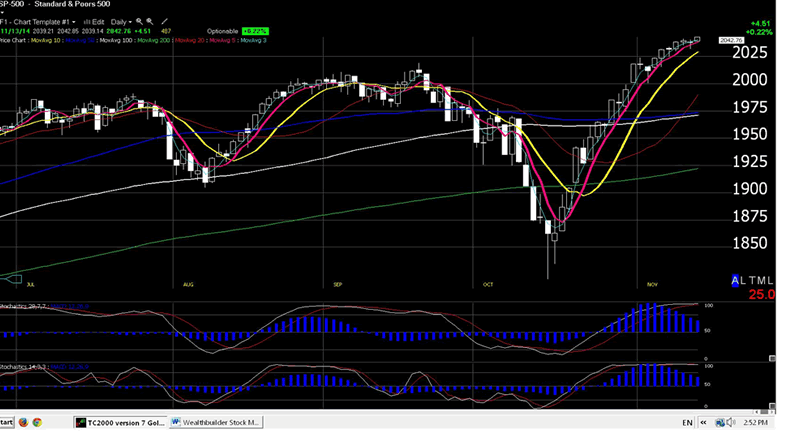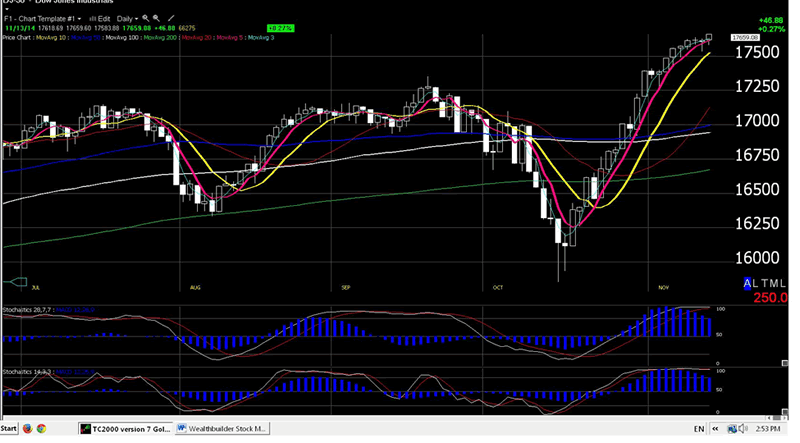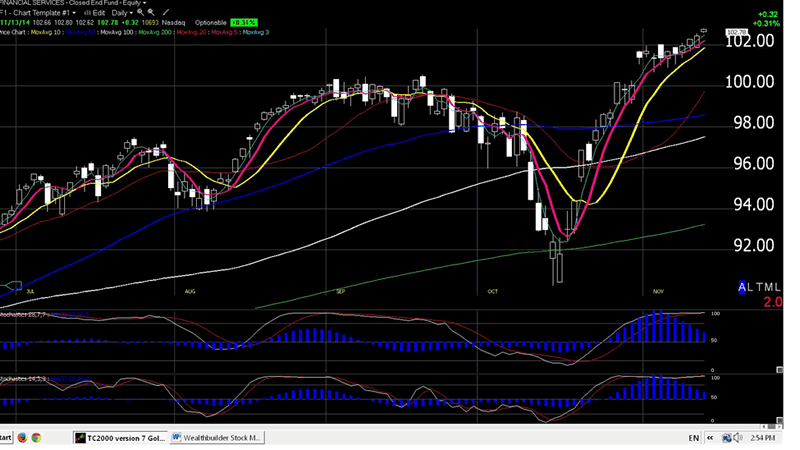Stocks and the Unfolding Economic Crisis in Europe
Stock-Markets / Stock Markets 2014 Nov 13, 2014 - 05:57 PM GMT Since October 24th Der Spiegel the German newspaper has been running a fascinating series of essays on the unfolding economic crisis in Europe. The scope and detail of the series has caused a bit of an online stir in that this bastion of German mainstream journalism painted a very negative view of the future and accordingly many are wondering whether the German elite are finally beginning to question the sustainability of the current monetary paradigm. To get a sense of the tone of these articles here a few excerpts:
Since October 24th Der Spiegel the German newspaper has been running a fascinating series of essays on the unfolding economic crisis in Europe. The scope and detail of the series has caused a bit of an online stir in that this bastion of German mainstream journalism painted a very negative view of the future and accordingly many are wondering whether the German elite are finally beginning to question the sustainability of the current monetary paradigm. To get a sense of the tone of these articles here a few excerpts:
“Germany and the Loss of Inclusion:
A new buzzword is circulating in the world's convention centers and auditoriums. It can be heard at the World Economic Forum in Davos, Switzerland, and at the annual meeting of the International Monetary Fund. Bankers sprinkle it into the presentations; politicians use it leave an impression on discussion panels.
“The buzzword is "inclusion" and it refers to a trait that Western industrialized nations seem to be on the verge of losing: the ability to allow as many layers of society as possible to benefit from economic advancement and participate in political life.
When the Berlin Wall came down 25 years ago, the West's liberal economic and social order seemed on the verge of an unstoppable march of triumph. Communism had failed, politicians worldwide were singing the praises of deregulated markets and US political scientist Francis Fukuyama was invoking the "end of history."
Today, no one talks anymore about the beneficial effects of unimpeded capital movement. Today's issue is "secular stagnation," as former US Treasury Secretary Larry Summers puts it. The American economy isn't growing even half as quickly as did in the 1990s. Japan has become the sick man of Asia. And Europe is sinking into a recession that has begun to slow down the German export machine and threaten prosperity.
Capitalism of Uncertainty:
Capitalism in the 21st century is a capitalism of uncertainty, as became evident once again last week. All it took were a few disappointing US trade figures and suddenly markets plunged worldwide, from the American bond market to crude oil trading. It seemed only fitting that the turbulence also affected the bonds of the country that has long been seen as an indicator of jitters: Greece. The financial papers called it a "flash crash."
Politicians and business leaders everywhere are now calling for new growth initiatives, but the governments' arsenals are empty. The billions spent on economic stimulus packages following the financial crisis have created mountains of debt in most industrialized countries and they now lack funds for new spending programs.
Central banks are also running out of ammunition. They have pushed interest rates close to zero and have spent hundreds of billions to buy government bonds. Yet the vast amounts of money they are pumping into the financial sector is not making its way into the economy.
Be it in Japan, Europe or the United States, companies are hardly investing in new machinery or factories anymore. Instead, prices are exploding on the global stock, real estate and bond markets, a dangerous boom driven by cheap money, not by sustainable growth. Experts with the Bank for International Settlements have already identified "worrisome signs" of an impending crash in many areas. In addition to creating new risks, the West's crisis policy is also exacerbating conflicts in the industrialized nations themselves. While workers' wages are stagnating and traditional savings accounts are yielding almost nothing, the wealthier classes -- those that derive most of their income by allowing their money to work for them -- are profiting handsomely.
It's no wonder, then, that people can no longer get much out of the system. According to polls by the Allensbach Institute, only one in five Germans believes economic conditions in Germany are "fair." Almost 90 percent feel that the gap between rich and poor is "getting wider and wider."
In this sense, the crisis of capitalism has turned into a crisis of democracy. Many feel that their countries are no longer being governed by parliaments and legislatures, but by bank lobbyists, which apply the logic of suicide bombers to secure their privileges: Either they are rescued or they drag the entire sector to its death.”
Switzerland and the Wealth of Medieval Princes:
For decades, Switzerland was based on a unique form of popular capitalism, which promised small craftsmen as many benefits as those who worked in high finance. Switzerland was the discreet tax haven for the world's rich, while simultaneously laying claim to Europe's highest wage levels -- a Rolex model of the social welfare state.
But the country's established class consensus was shattered by the excesses of the financial crisis -- the $60 billion bailout of its biggest bank, UBS, and the millions in golden parachutes paid out to executives so that they wouldn't go to the competition after being jettisoned by their companies.
Since then, a hint of class struggle pervades Swiss Alpine valleys. A series of popular initiatives have been launched, initiatives the financial newspapers have labeled "anti-business." To begin with, the Swiss voted on and approved a cap on so-called "rip-off salaries." Another referendum sought to impose a ceiling on executive compensation, but it failed. A proposal by Social Democrats, Greens and the socially conservative EVP, to support government pensions with a new tax on large inheritances, will be put to a referendum soon.
Income isn't the problem in Switzerland, where the gap between rich and poor is no wider than in Germany or France. The problem is assets. No other country has as many major shareholders, financiers and investors, and in no country is as much capital concentrated in so few hands. The assets of the 100 wealthiest Swiss citizens have increased almost fivefold in the last 25 years. In the Canton of Zürich, the 10 richest residents own as much as the poorest 500,000. When a Swiss business owner died recently, his two heirs inherited an estate worth as much as all single-family homes and owner-occupied flats in the Canton of Appenzell Innerrhoden. Wealth has become so concentrated in Switzerland, says the former head of the Zürich statistics office, that it "rivals the wealth of medieval princes."”
Deflation Raises Its Ugly Head In Euroland:
Apart from the issue of economic, social and political exclusion highlighted above, Europe’s other major problem is deflation.
To combat a serious collapse in the circulation of money the ECB has embarked on the drastic policy of negative interest rates. Here is what a popular blog has to say about this matter:
“It Begins: German Bank 'Charging' Negative Interest To Its Retail Customers:
Submitted by Simon Black via Sovereign Man blog, 4th. November 2014
Central bankers today have a delusional view of the world. Just three months ago, Mario Draghi (President of the European Central Bank) embarked on his own folly by taking certain interest rates into NEGATIVE territory.
Draghi convinced himself that he was saving Europe from disaster. And like Don Quixote of Spanish lore, everyone else has had to pay the price for his delusions.
On November 1st, the first European bank has passed along these negative interest rates to its retail customers.
So if you maintain a balance of more than 500,000 euros at Deutsche Skatbank of Germany, you now have the privilege of paying 0.25% per year… to the bank.
We’ve already seen this at the institutional level: commercial banks in Europe are paying the ECB negative interest on certain balances.
And large investors are paying European governments negative interest on certain bonds.
Now we’re seeing this effect bleed over into retail banking.
It’s starting with higher net worth individuals (the average guy doesn’t have half a million euros laying around in the bank). But the trend here is pretty clear– financial repression is coming soon to a bank near you.
It almost seems like an episode from the Twilight Zone… or some bizarre parallel universe. That’s the investment environment we’re in now.
Bottom line: if you’re responsible with your money and set some aside for the future, you will be penalized. If you blow your savings and go into debt, you will be rewarded.
If we ask the question “cui bono”, the answer is pretty obvious: heavily indebted governments benefit substantially from zero (or negative) rates.
On the ECB’s own website, they say that negative interest rates will “benefit savers in the end because they support growth and thus create a climate in which interest rates can gradually return to higher levels.”
I’m not sure a more intellectually dishonest statement could be made; they’re essentially telling people that the path to prosperity is paved in debt and consumption, as opposed to savings and production.
These people either have no idea how economies grow and prosper, they’re outright liars, or they’re completely delusional.”
In my opinion the main reason why deflation is spreading throughout Europe is the fact that stratospheric structural unemployment rates exist among European youth in Cyprus, Greece, Portugal, Spain and Italy. Seven years on no strategic initiative has emerged from Brussels to tackle this serious human catastrophe. How long it can continue without social breakdown is any ones guess but it is this factor which is behind regions such as Catalonia and Scotland seeking to “go it alone”.
Many believe that the only long term solution to Europe’s economic malaise is reversion back to a union of sovereign states within an economic union rather than a political and monetary one. Such a move would allow the inefficient southern European states devalue their currencies and thus achieve economic competitiveness. However it would appear the powers that be will not countenance such a move. Sometimes it requires fate to take a hand. I am sure in 1989 the politburo of the Soviet Union did not wish to see their hegemony diminish but their Empire collapsed, not due to desire but due to the sovereign power of economic truth.
Is The Market Consolidating In Preparation For Going Hyperbolic?
Despite the recent run up in the markets since the 17th. of October when you look at the S & P 500, The Dow Industrials and the NASDAQ there is no evidence to be seen of real momentum breakdown.
Yes the market advance has lost some power over the last week but this looks to me like the market is merely catching its breath in preparation for a strong rally into the New Year.
Such price action allows the main indices to wear down their overbought positions through time rather than through price retraction.
Thus while ideally I would a nice pullback to give some technical support to new long positions entered into I do not think it is going to happen. Thus any major moves up should be taken advantage of as I believe that market has a higher probability of going hyperbolic in early 2015 than contracting significantly.
Chart: S & P 500: Daily

Chart: Dow Industrials: Daily

Chart: QQQ ETF: Daily

B.Sc., M.M.I.I. Grad., M.A.
http://www.wealthbuilder.ie
Mr. Quigley was born in 1958 in Dublin, Ireland. He holds a Bachelor Degree in Accounting and Management from Trinity College Dublin and is a graduate of the Marketing Institute of Ireland. He commenced investing in the stock market in 1989 in Belmont, California where he lived for 6 years. He has developed the Wealthbuilder investment and trading course over the last two decades as a result of research, study and experience. This system marries fundamental analysis with technical analysis and focuses on momentum, value and pension strategies.
Since 2007 Mr. Quigley has written over 80 articles which have been published on popular web sites based in California, New York, London and Dublin.
Mr. Quigley is now lives in Dublin, Ireland and Tampa Bay, Florida.
© 2014 Copyright Christopher M. Quigley - All Rights Reserved
Disclaimer: The above is a matter of opinion provided for general information purposes only and is not intended as investment advice. Information and analysis above are derived from sources and utilising methods believed to be reliable, but we cannot accept responsibility for any trading losses you may incur as a result of this analysis. Individuals should consult with their personal financial advisors before engaging in any trading activities.
Christopher M. Quigley Archive |
© 2005-2022 http://www.MarketOracle.co.uk - The Market Oracle is a FREE Daily Financial Markets Analysis & Forecasting online publication.



